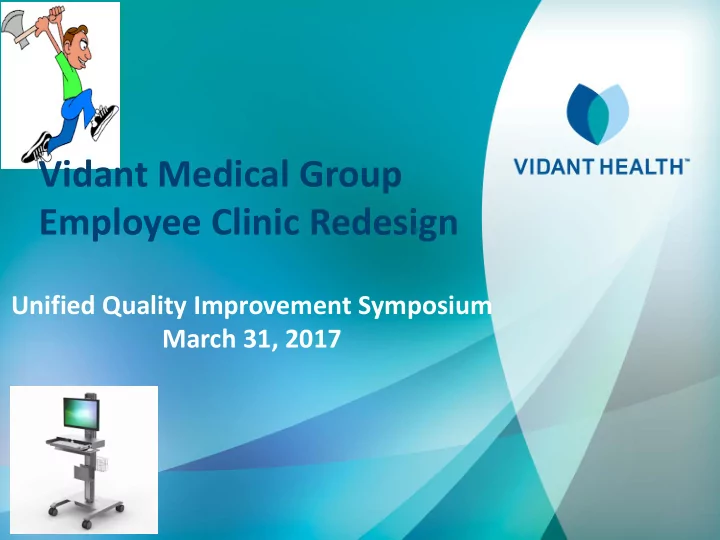

Vidant Medical Group Employee Clinic Redesign Unified Quality Improvement Symposium March 31, 2017
Background Employee Clinic Primary and acute care • Open to all Vidant Employees regardless of insurance • Including dependents over 13 years old with MedCost insurance • Benefit within insurance coverage • Freestanding ambulatory clinic • Clinic History • Opened in 2006 with multiple changes in services provided and hours of operation • High provider turnover • Poor patient satisfaction scores • Low moral • Limited access • Multiple variations in provision of care among providers
Entity Name: Vidant Medical Group Project Name: Employee Clinic Redesign Project Leader(s) Amy McMahon, Nurse Supervisor and Discipline: Shelton Nelson, Administrator Joseph Pye, MD, Medical Director Clyde Brooks, MD Team Providers Valerie Buffaloe, FNP Member Karen Pilkington, FNP Name(s) Howard Stallings, PA and Ellen Boggs, CMA Clinical Staff Kim Green, CNA Discipline: Tina Hartley, CMA Michelle Jones, LPN Ashley Moore, LPN Vivica Lockamy, Office Assistant PAS Staff Claretha Morning, Office Assistant Darlene Pyle, Office Assistant
Project Mission Enhance patient experience and quality of care through the use of standardization with methods that can be reproduced for future projects
Goals Improve patient cycle times by 20% Maintain patient volumes during implementation of change Improve CG-CAHPS scores by 10%: Provider seen in 15 Prompt responses to Access to care Helpful staff minutes questions and needs
Baseline Data • Average 57 minutes appointment length 9, 898.06 • wRVUs 2015 • Not meeting CG-CAHPS goals
CG-CAHPS Baseline Data 2015 Measure Top Box Percentile 49.2 Timely Immediate Care Appointments 54.1 Timely Routine Care Appointments 51.7 Same Day Answer to Medical Questions 40.6 Provider Seen within 15 minutes 70.1 Helpfulness of Staff 79.4 Courteous/Respectful Staff
Interventions Patient Centered Care • Focus on “Voice of the Patient” • Awareness of complete patient experience • Follow up questions, refills, forms, etc. • Daily allotment of administrative time • Written materials for standards of care and expectations • Waiting room outreach program Staff Development • Utilization of certified and licensed clinical support staff • Defined top of licensure/scope of practice for delineation of clinical responsibilities • Staff Education • Best practices and standards of care • Electronic health record training • Utilization of standing orders, policies, and governance
Interventions Workflow Standardization • Patient intake • Initiate clinic note for provider to complete • Health Maintenance • Configuration and adoption of standardized EHR inbasket messaging workflows • Messages initiated through EHR and not voicemail • Support staff monitor inbasket pools and messages Utilization of MyChart • Medical questions • Lab results • Prescription requests • Appointment requests
Interventions Provider education and collaboration • Align care with evidence based practice and regulatory agencies • Medication Prescribing • Antibiotics, controlled substances, etc • Emergencies and elevation of level of care • Ongoing didactic sessions Standard patient scheduling templates • Separation of acute providers and primary care providers • Single appointment length Decentralized outgoing referral completion
Outcomes Appointment Cycle Time (Minutes) 60 57 50 40 38 30 20 10 0 2015 2016
Outcomes wRVUs 10,500.00 10,454.41 10,400.00 10,300.00 10,200.00 10,100.00 10,000.00 9,898.06 9,900.00 9,800.00 9,700.00 9,600.00 2015 2016 wRVUs
Outcomes HealthStream CG-CAHPS Top Box 84.7 COURTEOUS/RESPECTFUL STAFF 79.4 81.7 HELPFULLNESS OF STAFF 70.1 75 PROVIDER SEEN WITHIN 15 MINUTES 40.6 91.3 SAME DAY ANSWER TO MEDICAL QUESTIONS 51.7 90.5 TIMELY ROUTINE CARE APPOINTMENTS 54.1 91.1 TIMELY IMMEDIATE CARE APPOINTMENTS 49.2 0 10 20 30 40 50 60 70 80 90 100 2016 2015
Challenges Defining clinic culture and care model • Building trust • Developing education plans • Defining scope of practice for clinical staff • Broad regulations and standards for ambulatory care • Patient Centered Care • Realigning providers as part of a care team rather than independent agents • Emphasizing evidence-based care and the value of diagnostic and therapeutic consistency across providers EHR Integration • Validation and utilization of workflows • Development and revision of policies to support care through use of EHR • Staff education and training
Lessons Learned Changing a culture • Staff and provider participation enhances buy-in • Consistent, cohesive and engaged clinical and operational leadership is critical • Team-based culture begins at provider and staff recruiting and must be reinforced regularly • Adapting to patient’s expectations for convenient options for care • E-visits, MyChart correspondence, Scheduling tickets
Recommend
More recommend